初中英语外研版七年级下册Module 9 Life history Unit 2 He decided to be an actor. 练习 (含解析)
文档属性
| 名称 | 初中英语外研版七年级下册Module 9 Life history Unit 2 He decided to be an actor. 练习 (含解析) |
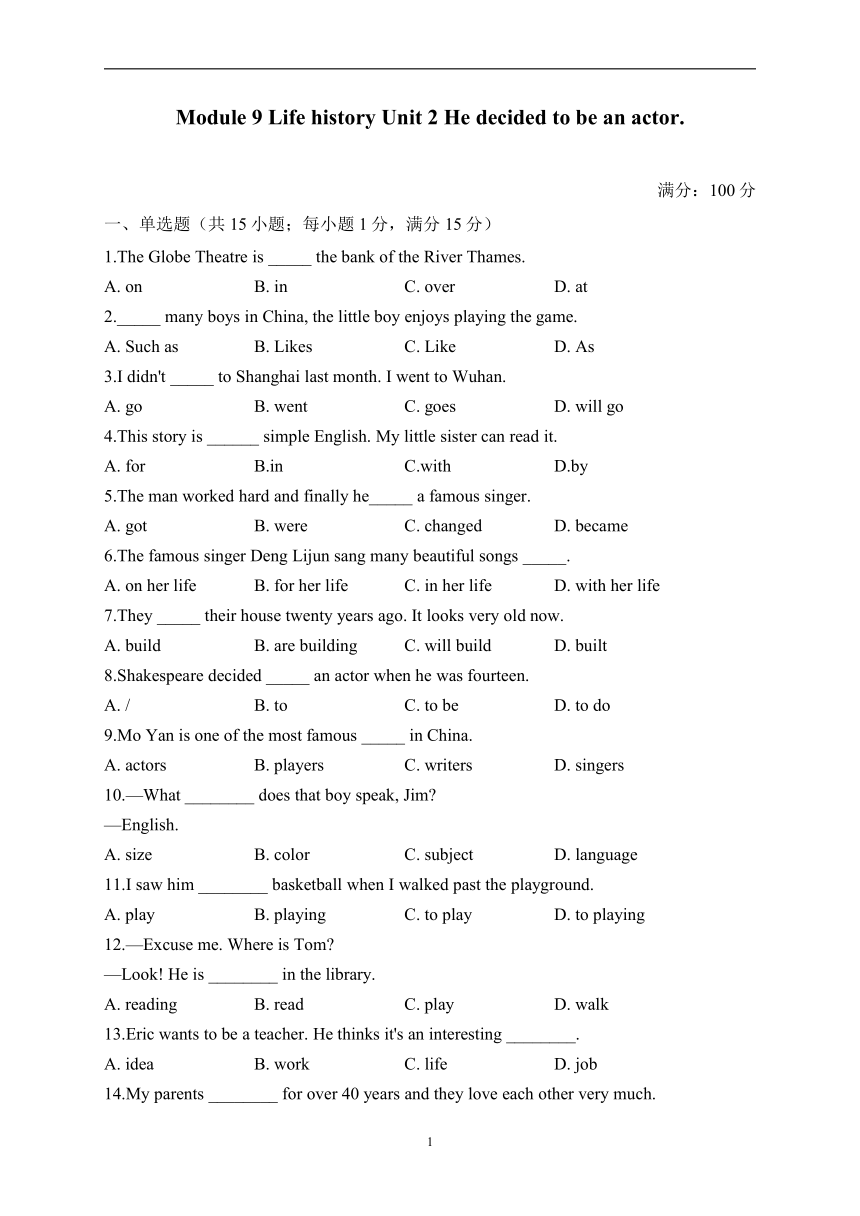
|
|
| 格式 | docx | ||
| 文件大小 | 31.8KB | ||
| 资源类型 | 教案 | ||
| 版本资源 | 外研版 | ||
| 科目 | 英语 | ||
| 更新时间 | 2023-09-13 13:44:33 | ||
图片预览

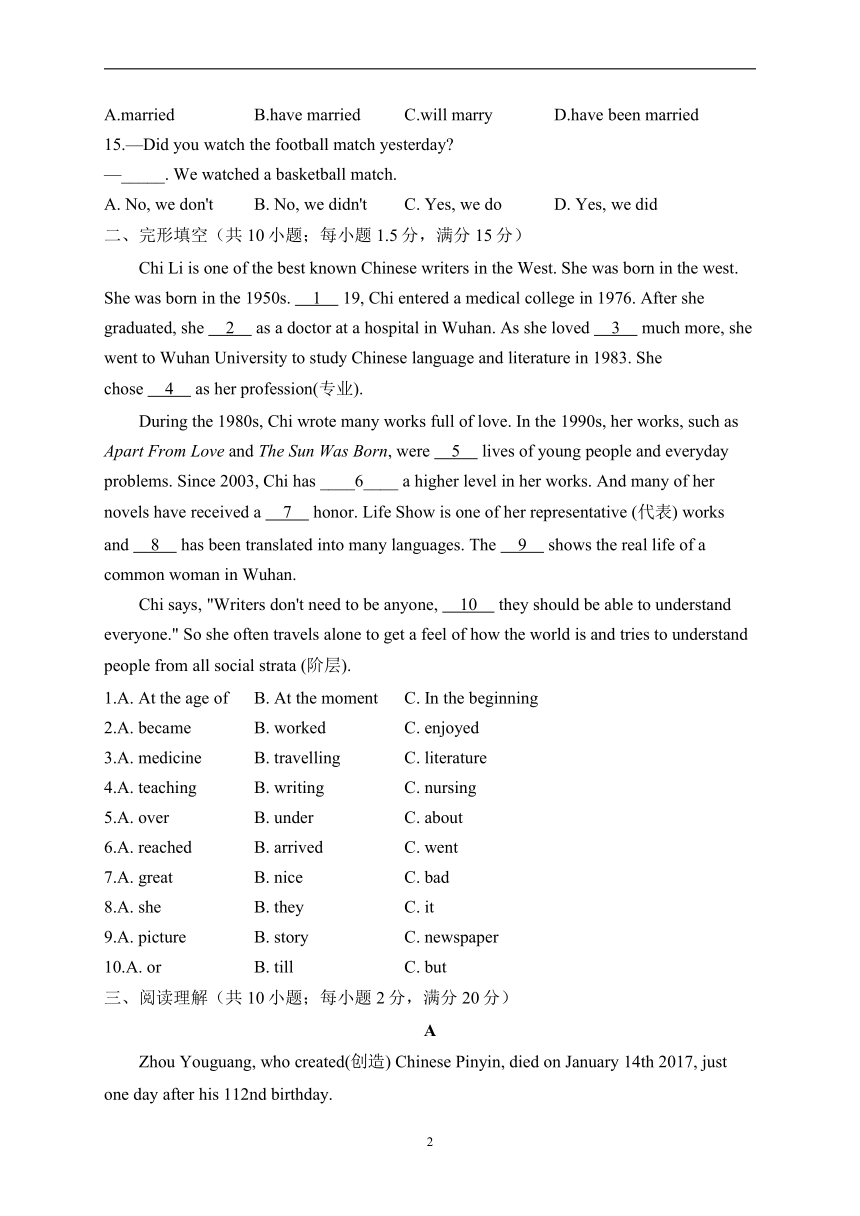
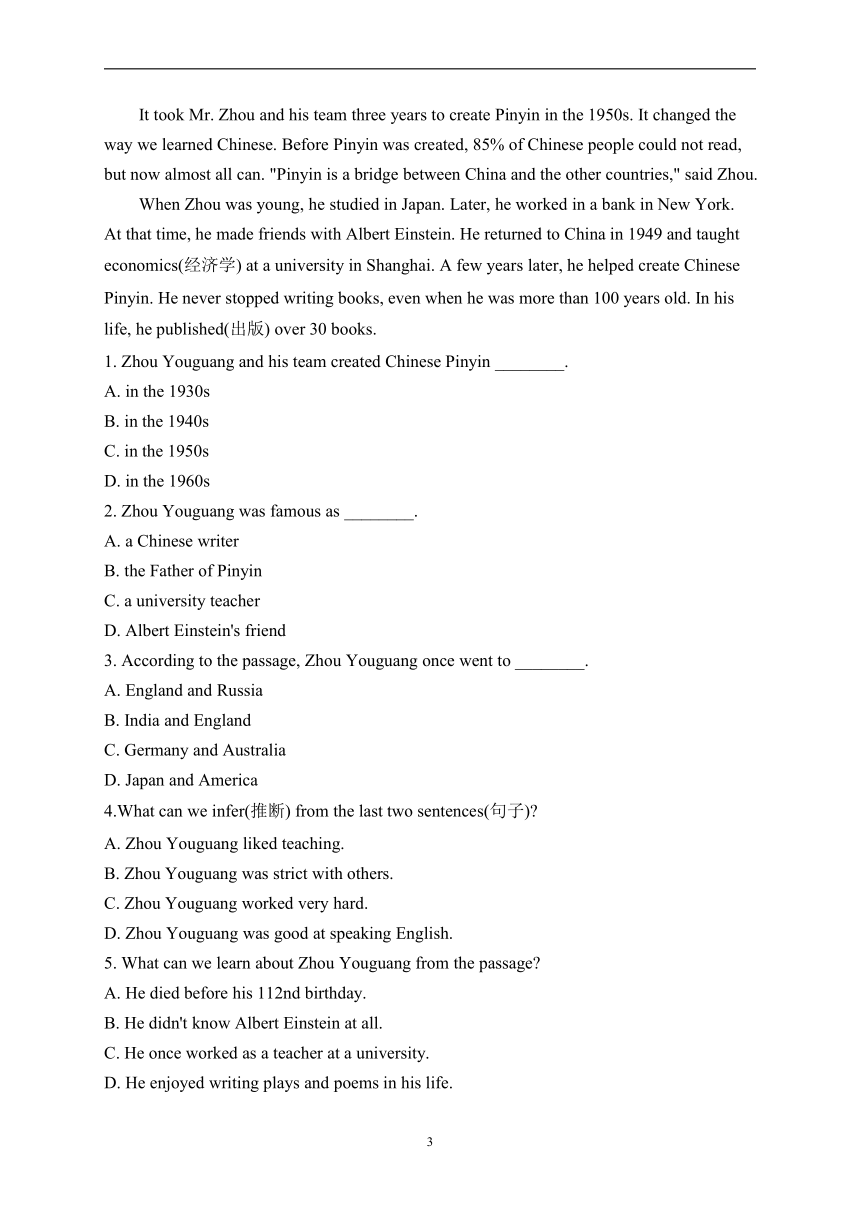
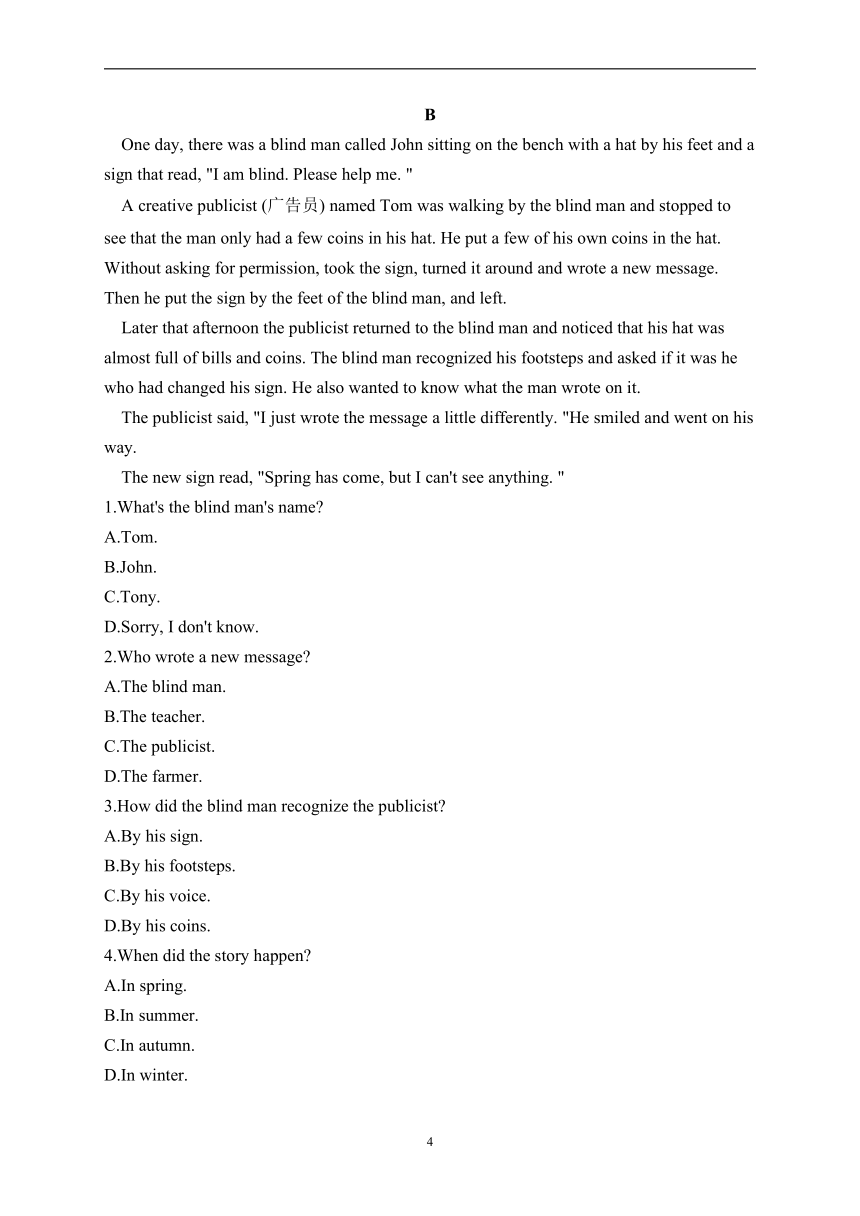
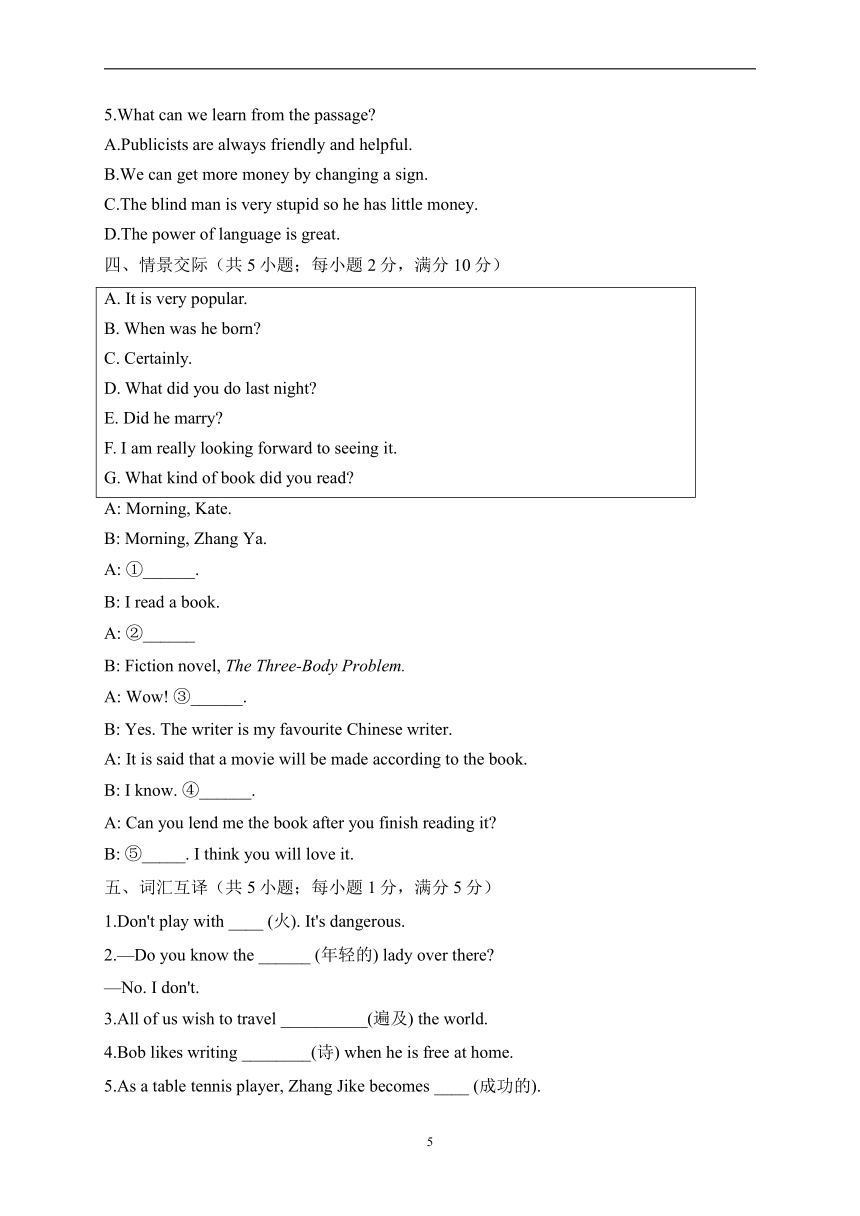
文档简介
Module 9 Life history Unit 2 He decided to be an actor.
满分:100分
一、单选题(共15小题;每小题1分,满分15分)
1.The Globe Theatre is _____ the bank of the River Thames.
A. on B. in C. over D. at
2._____ many boys in China, the little boy enjoys playing the game.
A. Such as B. Likes C. Like D. As
3.I didn't _____ to Shanghai last month. I went to Wuhan.
A. go B. went C. goes D. will go
4.This story is ______ simple English. My little sister can read it.
A. for B.in C.with D.by
5.The man worked hard and finally he_____ a famous singer.
A. got B. were C. changed D. became
6.The famous singer Deng Lijun sang many beautiful songs _____.
A. on her life B. for her life C. in her life D. with her life
7.They _____ their house twenty years ago. It looks very old now.
A. build B. are building C. will build D. built
8.Shakespeare decided _____ an actor when he was fourteen.
A. / B. to C. to be D. to do
9.Mo Yan is one of the most famous _____ in China.
A. actors B. players C. writers D. singers
10.—What ________ does that boy speak, Jim
—English.
A. size B. color C. subject D. language
11.I saw him ________ basketball when I walked past the playground.
A. play B. playing C. to play D. to playing
12.—Excuse me. Where is Tom
—Look! He is ________ in the library.
A. reading B. read C. play D. walk
13.Eric wants to be a teacher. He thinks it's an interesting ________.
A. idea B. work C. life D. job
14.My parents ________ for over 40 years and they love each other very much.
A.married B.have married C.will marry D.have been married
15.—Did you watch the football match yesterday
—_____. We watched a basketball match.
A. No, we don't B. No, we didn't C. Yes, we do D. Yes, we did
二、完形填空(共10小题;每小题1.5分,满分15分)
Chi Li is one of the best known Chinese writers in the West. She was born in the west. She was born in the 1950s. 1 19, Chi entered a medical college in 1976. After she graduated, she 2 as a doctor at a hospital in Wuhan. As she loved 3 much more, she went to Wuhan University to study Chinese language and literature in 1983. She chose 4 as her profession(专业).
During the 1980s, Chi wrote many works full of love. In the 1990s, her works, such as Apart From Love and The Sun Was Born, were 5 lives of young people and everyday problems. Since 2003, Chi has ____6____ a higher level in her works. And many of her novels have received a 7 honor. Life Show is one of her representative (代表) works and 8 has been translated into many languages. The 9 shows the real life of a common woman in Wuhan.
Chi says, "Writers don't need to be anyone, 10 they should be able to understand everyone." So she often travels alone to get a feel of how the world is and tries to understand people from all social strata (阶层).
1.A. At the age of B. At the moment C. In the beginning
2.A. became B. worked C. enjoyed
3.A. medicine B. travelling C. literature
4.A. teaching B. writing C. nursing
5.A. over B. under C. about
6.A. reached B. arrived C. went
7.A. great B. nice C. bad
8.A. she B. they C. it
9.A. picture B. story C. newspaper
10.A. or B. till C. but
三、阅读理解(共10小题;每小题2分,满分20分)
A
Zhou Youguang, who created(创造) Chinese Pinyin, died on January 14th 2017, just one day after his 112nd birthday.
It took Mr. Zhou and his team three years to create Pinyin in the 1950s. It changed the way we learned Chinese. Before Pinyin was created, 85% of Chinese people could not read, but now almost all can. "Pinyin is a bridge between China and the other countries," said Zhou.
When Zhou was young, he studied in Japan. Later, he worked in a bank in New York. At that time, he made friends with Albert Einstein. He returned to China in 1949 and taught economics(经济学) at a university in Shanghai. A few years later, he helped create Chinese Pinyin. He never stopped writing books, even when he was more than 100 years old. In his life, he published(出版) over 30 books.
1. Zhou Youguang and his team created Chinese Pinyin ________.
A. in the 1930s
B. in the 1940s
C. in the 1950s
D. in the 1960s
2. Zhou Youguang was famous as ________.
A. a Chinese writer
B. the Father of Pinyin
C. a university teacher
D. Albert Einstein's friend
3. According to the passage, Zhou Youguang once went to ________.
A. England and Russia
B. India and England
C. Germany and Australia
D. Japan and America
4.What can we infer(推断) from the last two sentences(句子)
A. Zhou Youguang liked teaching.
B. Zhou Youguang was strict with others.
C. Zhou Youguang worked very hard.
D. Zhou Youguang was good at speaking English.
5. What can we learn about Zhou Youguang from the passage
A. He died before his 112nd birthday.
B. He didn't know Albert Einstein at all.
C. He once worked as a teacher at a university.
D. He enjoyed writing plays and poems in his life.
B
One day, there was a blind man called John sitting on the bench with a hat by his feet and a sign that read, "I am blind. Please help me. "
A creative publicist (广告员) named Tom was walking by the blind man and stopped to see that the man only had a few coins in his hat. He put a few of his own coins in the hat. Without asking for permission, took the sign, turned it around and wrote a new message. Then he put the sign by the feet of the blind man, and left.
Later that afternoon the publicist returned to the blind man and noticed that his hat was almost full of bills and coins. The blind man recognized his footsteps and asked if it was he who had changed his sign. He also wanted to know what the man wrote on it.
The publicist said, "I just wrote the message a little differently. "He smiled and went on his way.
The new sign read, "Spring has come, but I can't see anything. "
1.What's the blind man's name
A.Tom.
B.John.
C.Tony.
D.Sorry, I don't know.
2.Who wrote a new message
A.The blind man.
B.The teacher.
C.The publicist.
D.The farmer.
3.How did the blind man recognize the publicist
A.By his sign.
B.By his footsteps.
C.By his voice.
D.By his coins.
4.When did the story happen
A.In spring.
B.In summer.
C.In autumn.
D.In winter.
5.What can we learn from the passage
A.Publicists are always friendly and helpful.
B.We can get more money by changing a sign.
C.The blind man is very stupid so he has little money.
D.The power of language is great.
四、情景交际(共5小题;每小题2分,满分10分)
A. It is very popular. B. When was he born C. Certainly. D. What did you do last night E. Did he marry F. I am really looking forward to seeing it. G. What kind of book did you read
A: Morning, Kate.
B: Morning, Zhang Ya.
A: ①______.
B: I read a book.
A: ②______
B: Fiction novel, The Three-Body Problem.
A: Wow! ③______.
B: Yes. The writer is my favourite Chinese writer.
A: It is said that a movie will be made according to the book.
B: I know. ④______.
A: Can you lend me the book after you finish reading it
B: ⑤_____. I think you will love it.
五、词汇互译(共5小题;每小题1分,满分5分)
1.Don't play with ____ (火). It's dangerous.
2.—Do you know the ______ (年轻的) lady over there
—No. I don't.
3.All of us wish to travel __________(遍及) the world.
4.Bob likes writing ________(诗) when he is free at home.
5.As a table tennis player, Zhang Jike becomes ____ (成功的).
六、句型转换(共5小题;每小题2分,满分10分)
1.She is a successful actress. (对画线部分提问)
_______ _________ she
2.Jim got married in 1582. (对画线部分提问)
_______ _______ Jim _________ ________
3.Tan Lei became a member of the Party in 1995. (改为同义句)
Tan Lei _________ the Party in 1995.
4.We enjoyed ourselves at the party.(改为同义句)
We__________ __________ __________ __________at the party.
5.He moved to New York when he was eighteen.(改为同义句)
He moved to New York ______ ______ _______ _________ eighteen.
七、书面表达(共1小题;满分25分)
30.刘伟是一位无臂(armless)的钢琴演奏者。十岁时,他在一次意外中失去双臂,但他并没有放弃(give up)成为一名钢琴家的梦想。他用脚刻苦练习弹琴。最终在“中国达人秀(China’s Got Talent)”的舞台上实现了自己的梦想。请根据以上内容写一篇80词左右的英语短文。
要求:
(1)内容完整,语意连贯,语句通顺;
(2)文章必须包含以上信息,可适当发挥;
(3)文章开头部分已给出,不计入总词数。
Liu Wei, an armless piano player, has a very special experience.
____________________________________________________________________________________________________________________________________________________________________________________________________________________________________________________________________________________________________________
答案以及解析
一、单选题
1.答案:A
解析:句意为:环球剧场坐落于泰晤士河畔。on作介词,意为"在(某地)"。故选A。
2.答案:C
解析:句意为:像许多中国的男孩子一样,那个小男孩喜欢玩游戏。like作介词,意为"像",符合语境。故选C。
3.答案:A
解析:didn't后面跟动词原形。故选A。
4.答案:B
解析:句意:这个故事是用简单的英语写的。我的小妹妹都能读。for为,为了;in用,在……里面;with带有,和……一起;by由,被。短语in English意为"用英语"。故选B。
5.答案:D
解析:结合语境可知,此处表示"成为一名著名的歌唱家"。故选D。
6.答案:C
解析:句意为:著名歌手邓丽君一生中唱了很多好听的歌曲。in one's life是固定搭配,意为"在……一生中"。故选C。
7.答案:D
解析:根据twenty years ago可知用一般过去时, build的过去式为built。故选D。
8.答案:C
解析:句意为:当莎士比亚14岁的时候,他决定成为一名演员。decide to do sth意为"决定做某事"。故选C。
9.答案:C
解析:actor意为"演员";player意为"运动员"; writer意为"作家";singer意为"歌手"。结合常识可知,莫言是作家。故选C。
10.答案:D
解析:句意:——Jim,那男孩会说什么语言?——英语。考查名词辨析。size尺寸;color颜色;subject学科;language语言。根据答语"English."可知是语言。故选D。
11.答案:B
解析:句意:当我经过操场时,我看见他正在打篮球。考查非谓语动词。play是动词,意为"玩,打(球)";see sb. doing sth.看见某人正在做……,see sb. do sth.看见某人做了某事;此处表示"当我路过的时候看到某人正在打篮球"。故选B。
12.答案:A
解析:句意:——抱歉打扰,汤姆在哪?——看,他正在图书馆看书。考查动词和时态。reading现在分词;read读,动词原形;play玩;walk走。根据"Look"可知句子讲述正在发生的动作,是现在进行时,根据"in the library"可知表达在图书馆看书,动词用"is reading"。故选A。
13.答案:D
解析:句意:埃里克想成为一名教师。他认为这很有趣。考查名词词义辨析。idea想法;work工作;life生活;job工作。根据语境"He thinks it's an interesting..."可知,it指代的是教师这个工作,排除A、C选。根据不定冠词"an"可知,此处需要填可数名词单数。work翻译成"工作"时是不可数名词,job可数名词,所以排除B。故选D。
14.答案:D
解析:句意:我的父母已经结婚40多年了,他们非常相爱。考查动词时态。根据"for over 40 years"可知应该用延续性动词的现在完成时结构have been married。故选D。
15.答案:B
解析:句意为: —昨天你们看足球比赛了吗 —没有。我们看了一场篮球比赛。根据答语中的basketball可知应给出否定回答;同时根据yesterday可知应用一般过去时。故选B。
二、完形填空
答案:1-5ABCBC 6-10AACBC
解析:1.这是一篇记叙文,文章介绍了中国著名的西部作家池莉,讲述她的成长过程以及伟大的成就。句意:1976年,在她19岁时,池莉上了医科大学。at the age of在……岁时;at the moment此刻,现在;in the beginning起初,在开始的时候。根据"Chi entered a medical college in 1976"可知表达"在17岁的时候",用介词短语"at the age of"。故选A。
2.句意:毕业后,她在武汉的一家医院当医生。became成为;worked工作; enjoyed喜欢。根据" as a doctor at a hospital"可知表达她的工作,用动词短语"work as"。故选B。
3.句意:由于她更爱文学,她在1983年去武汉大学学习汉语言文学。medicine医药; travelling旅行;literature文学。根据"study Chinese language and literature"她上了汉语言文学专业,可知句子表达她爱好"文学"更多,用名词"literature"。故选C。
4.句意:她选择写作作为她的专业。teaching教学;writing写作;nursing护理。根据前文"Chi Li is one of the best-known Chinese writers"以及后文讲述她写了许多作品。可知,她选择的专业是"写作",用动名词"writing"。故选B。
5.句意:在20世纪90年代,她的作品,比如,《不谈爱情》和《太阳出世》都是关于年轻人的生活和日常问题的。over多于;under在……的下面;about关于。根据"lives of young people and everyday problems"可知讲述小说是关于什么方面的内容,用介词"about "。故选C。
6.句意:从2003年开始,她的作品就达到了更高的境界。reached达到,及物动词;arrived到达,不及物动词;went去。根据" a higher level"可知表达"达到了更高的境界",用及物动词"reached"。故选A。
7.句意:她的许多小说都获得了极高的荣誉。great优秀的,杰出的; nice美好的; bad坏的。根据" a higher level"可知表达"一个很高的荣誉"用名词短语"a great honor"。故选A。
8.句意:《生活秀》是她的代表作之一,已被翻译成多种语言。she她;they他们;it它。代替上文中的"Life show",用单数形式"it"。故选C。
9.句意:这个故事展示了一个武汉普通女人的真实生活。picture图片;story故事;newspaper新闻。根据"the real life of a common woman in Wuhan"可知表达文章中的"故事",用名词"story"。故选B。
10.句意:作家不需要成为任何人,但他们应该能够理解每个人。or否则;till直到; but但是。根据"Writers don't need to be anyone"及"they should be able to understand everyone"可知前后句是转折关系,用连词"but "。故选C。
三、阅读理解
A
答案:1-5CBDCC
解析:1.细节理解题。根据短文第二段 "It took Mr. Zhou and his team three years to create Pinyin in the 1950s."可知,周有光和他的团队是在上世纪50年代创造出了汉语拼音。故选C。
2.细节理解题。根据短文开头 "Zhou Youguang, who created(创造) Chinese Pinyin"可知,周有光创造了汉语拼音,被称为"汉语拼音之父",这是他最伟大的成就。故选B。
3.细节理解题。根据短文第三段 "When Zhou was young, he studied in Japan. Later, he worked in a bank in New York."可知,周有光年轻时在日本读书,后来在纽约的一个银行工作。由此可知他去过日本和美国。故选D。
4.推理判断题。由文章最后两句话 "He never stopped writing books, even when he was more than 100 years old. In his life, he published(出版) over 30 books." "他从没停止写书,甚至当他已经100多岁的时候。在他的一生中,他出版了30多本书"。从这里可以看出周有光工作非常努力。故选C。
5.细节理解题。根据短文第三段 "He returned to China in 1949 and taught economics(经济学) at a university in Shanghai."可知,周有光回国后,在上海的一所大学里教书,C选项符合文意。故选C。根据短文第一段 "Zhou Youguang, who created(创造) Chinese Pinyin, died on January 14th 2017, just one day after his 112nd birthday."可知A不对;根据第三段 "At that time, he made friends with Albert Einstein."可知B不对;文章中并没有说周有光喜欢写戏剧和诗歌,故D选项不对。
B
答案:1.B; 2.C; 3.B; 4.A; 5.D
解析:1.根据One day, there was a blind man called John 可知选B。
2.根据Without asking for permission, he took the sign, turned it around and wrote a new message.he指的是前文提到的广告员,可知选C。
3.根据The blind man recognized(认出,识别出)his footsteps 可知选B。
4.根据The new sign read,"Spring has come, but I can't see anything."描述可知,这个故事可能发生在春天。故选A。
5.仅仅是一句话就让人们对这位盲人增加了许多同情,这告诉了我们语言的力量是伟大的。故选D。
四、情景交际
答案:①-⑤DGAFC
解析:①根据答语"I read a book."可知,问句询问对方干了什么。故选D。
②根据答语"Fiction novel, The Three-Body Problem."可知,问句是询问书的名称或类型。结合选项。故选G。
③根据"Wow!"和"Yes "可知,此处是对这本书的评价。故选A。
④根据"It is said that a movie will be made according to the book."及选项可知,此处表示期待看到那部电影。故选F。
⑤根据"I think you will love it."和上一问句可知,此处表示答应对方借书的请求。故选C。
五、词汇互译
1.答案:fire
2.答案:young
3.答案:around
4.答案:poems
5.答案:successful
六、句型转换
1.答案:What is
2.答案:When did, get married
3.答案:joined
4.答案:had; a ; good ; time
5.答案:at the age of
30.答案:
Liu Wei, an armless piano player, has a very special experience.
He lost his arms in an accident at the age of 10, but he didn't give up his dream of being a pianist. He began to practise playing the piano with his feet. Finally, his dream came true inChina's Got Talent.
As a student, I learnt a lot from his story. We may meet some difficulties in our life, but we should believe that our dreams will come true by working hard.
2
满分:100分
一、单选题(共15小题;每小题1分,满分15分)
1.The Globe Theatre is _____ the bank of the River Thames.
A. on B. in C. over D. at
2._____ many boys in China, the little boy enjoys playing the game.
A. Such as B. Likes C. Like D. As
3.I didn't _____ to Shanghai last month. I went to Wuhan.
A. go B. went C. goes D. will go
4.This story is ______ simple English. My little sister can read it.
A. for B.in C.with D.by
5.The man worked hard and finally he_____ a famous singer.
A. got B. were C. changed D. became
6.The famous singer Deng Lijun sang many beautiful songs _____.
A. on her life B. for her life C. in her life D. with her life
7.They _____ their house twenty years ago. It looks very old now.
A. build B. are building C. will build D. built
8.Shakespeare decided _____ an actor when he was fourteen.
A. / B. to C. to be D. to do
9.Mo Yan is one of the most famous _____ in China.
A. actors B. players C. writers D. singers
10.—What ________ does that boy speak, Jim
—English.
A. size B. color C. subject D. language
11.I saw him ________ basketball when I walked past the playground.
A. play B. playing C. to play D. to playing
12.—Excuse me. Where is Tom
—Look! He is ________ in the library.
A. reading B. read C. play D. walk
13.Eric wants to be a teacher. He thinks it's an interesting ________.
A. idea B. work C. life D. job
14.My parents ________ for over 40 years and they love each other very much.
A.married B.have married C.will marry D.have been married
15.—Did you watch the football match yesterday
—_____. We watched a basketball match.
A. No, we don't B. No, we didn't C. Yes, we do D. Yes, we did
二、完形填空(共10小题;每小题1.5分,满分15分)
Chi Li is one of the best known Chinese writers in the West. She was born in the west. She was born in the 1950s. 1 19, Chi entered a medical college in 1976. After she graduated, she 2 as a doctor at a hospital in Wuhan. As she loved 3 much more, she went to Wuhan University to study Chinese language and literature in 1983. She chose 4 as her profession(专业).
During the 1980s, Chi wrote many works full of love. In the 1990s, her works, such as Apart From Love and The Sun Was Born, were 5 lives of young people and everyday problems. Since 2003, Chi has ____6____ a higher level in her works. And many of her novels have received a 7 honor. Life Show is one of her representative (代表) works and 8 has been translated into many languages. The 9 shows the real life of a common woman in Wuhan.
Chi says, "Writers don't need to be anyone, 10 they should be able to understand everyone." So she often travels alone to get a feel of how the world is and tries to understand people from all social strata (阶层).
1.A. At the age of B. At the moment C. In the beginning
2.A. became B. worked C. enjoyed
3.A. medicine B. travelling C. literature
4.A. teaching B. writing C. nursing
5.A. over B. under C. about
6.A. reached B. arrived C. went
7.A. great B. nice C. bad
8.A. she B. they C. it
9.A. picture B. story C. newspaper
10.A. or B. till C. but
三、阅读理解(共10小题;每小题2分,满分20分)
A
Zhou Youguang, who created(创造) Chinese Pinyin, died on January 14th 2017, just one day after his 112nd birthday.
It took Mr. Zhou and his team three years to create Pinyin in the 1950s. It changed the way we learned Chinese. Before Pinyin was created, 85% of Chinese people could not read, but now almost all can. "Pinyin is a bridge between China and the other countries," said Zhou.
When Zhou was young, he studied in Japan. Later, he worked in a bank in New York. At that time, he made friends with Albert Einstein. He returned to China in 1949 and taught economics(经济学) at a university in Shanghai. A few years later, he helped create Chinese Pinyin. He never stopped writing books, even when he was more than 100 years old. In his life, he published(出版) over 30 books.
1. Zhou Youguang and his team created Chinese Pinyin ________.
A. in the 1930s
B. in the 1940s
C. in the 1950s
D. in the 1960s
2. Zhou Youguang was famous as ________.
A. a Chinese writer
B. the Father of Pinyin
C. a university teacher
D. Albert Einstein's friend
3. According to the passage, Zhou Youguang once went to ________.
A. England and Russia
B. India and England
C. Germany and Australia
D. Japan and America
4.What can we infer(推断) from the last two sentences(句子)
A. Zhou Youguang liked teaching.
B. Zhou Youguang was strict with others.
C. Zhou Youguang worked very hard.
D. Zhou Youguang was good at speaking English.
5. What can we learn about Zhou Youguang from the passage
A. He died before his 112nd birthday.
B. He didn't know Albert Einstein at all.
C. He once worked as a teacher at a university.
D. He enjoyed writing plays and poems in his life.
B
One day, there was a blind man called John sitting on the bench with a hat by his feet and a sign that read, "I am blind. Please help me. "
A creative publicist (广告员) named Tom was walking by the blind man and stopped to see that the man only had a few coins in his hat. He put a few of his own coins in the hat. Without asking for permission, took the sign, turned it around and wrote a new message. Then he put the sign by the feet of the blind man, and left.
Later that afternoon the publicist returned to the blind man and noticed that his hat was almost full of bills and coins. The blind man recognized his footsteps and asked if it was he who had changed his sign. He also wanted to know what the man wrote on it.
The publicist said, "I just wrote the message a little differently. "He smiled and went on his way.
The new sign read, "Spring has come, but I can't see anything. "
1.What's the blind man's name
A.Tom.
B.John.
C.Tony.
D.Sorry, I don't know.
2.Who wrote a new message
A.The blind man.
B.The teacher.
C.The publicist.
D.The farmer.
3.How did the blind man recognize the publicist
A.By his sign.
B.By his footsteps.
C.By his voice.
D.By his coins.
4.When did the story happen
A.In spring.
B.In summer.
C.In autumn.
D.In winter.
5.What can we learn from the passage
A.Publicists are always friendly and helpful.
B.We can get more money by changing a sign.
C.The blind man is very stupid so he has little money.
D.The power of language is great.
四、情景交际(共5小题;每小题2分,满分10分)
A. It is very popular. B. When was he born C. Certainly. D. What did you do last night E. Did he marry F. I am really looking forward to seeing it. G. What kind of book did you read
A: Morning, Kate.
B: Morning, Zhang Ya.
A: ①______.
B: I read a book.
A: ②______
B: Fiction novel, The Three-Body Problem.
A: Wow! ③______.
B: Yes. The writer is my favourite Chinese writer.
A: It is said that a movie will be made according to the book.
B: I know. ④______.
A: Can you lend me the book after you finish reading it
B: ⑤_____. I think you will love it.
五、词汇互译(共5小题;每小题1分,满分5分)
1.Don't play with ____ (火). It's dangerous.
2.—Do you know the ______ (年轻的) lady over there
—No. I don't.
3.All of us wish to travel __________(遍及) the world.
4.Bob likes writing ________(诗) when he is free at home.
5.As a table tennis player, Zhang Jike becomes ____ (成功的).
六、句型转换(共5小题;每小题2分,满分10分)
1.She is a successful actress. (对画线部分提问)
_______ _________ she
2.Jim got married in 1582. (对画线部分提问)
_______ _______ Jim _________ ________
3.Tan Lei became a member of the Party in 1995. (改为同义句)
Tan Lei _________ the Party in 1995.
4.We enjoyed ourselves at the party.(改为同义句)
We__________ __________ __________ __________at the party.
5.He moved to New York when he was eighteen.(改为同义句)
He moved to New York ______ ______ _______ _________ eighteen.
七、书面表达(共1小题;满分25分)
30.刘伟是一位无臂(armless)的钢琴演奏者。十岁时,他在一次意外中失去双臂,但他并没有放弃(give up)成为一名钢琴家的梦想。他用脚刻苦练习弹琴。最终在“中国达人秀(China’s Got Talent)”的舞台上实现了自己的梦想。请根据以上内容写一篇80词左右的英语短文。
要求:
(1)内容完整,语意连贯,语句通顺;
(2)文章必须包含以上信息,可适当发挥;
(3)文章开头部分已给出,不计入总词数。
Liu Wei, an armless piano player, has a very special experience.
____________________________________________________________________________________________________________________________________________________________________________________________________________________________________________________________________________________________________________
答案以及解析
一、单选题
1.答案:A
解析:句意为:环球剧场坐落于泰晤士河畔。on作介词,意为"在(某地)"。故选A。
2.答案:C
解析:句意为:像许多中国的男孩子一样,那个小男孩喜欢玩游戏。like作介词,意为"像",符合语境。故选C。
3.答案:A
解析:didn't后面跟动词原形。故选A。
4.答案:B
解析:句意:这个故事是用简单的英语写的。我的小妹妹都能读。for为,为了;in用,在……里面;with带有,和……一起;by由,被。短语in English意为"用英语"。故选B。
5.答案:D
解析:结合语境可知,此处表示"成为一名著名的歌唱家"。故选D。
6.答案:C
解析:句意为:著名歌手邓丽君一生中唱了很多好听的歌曲。in one's life是固定搭配,意为"在……一生中"。故选C。
7.答案:D
解析:根据twenty years ago可知用一般过去时, build的过去式为built。故选D。
8.答案:C
解析:句意为:当莎士比亚14岁的时候,他决定成为一名演员。decide to do sth意为"决定做某事"。故选C。
9.答案:C
解析:actor意为"演员";player意为"运动员"; writer意为"作家";singer意为"歌手"。结合常识可知,莫言是作家。故选C。
10.答案:D
解析:句意:——Jim,那男孩会说什么语言?——英语。考查名词辨析。size尺寸;color颜色;subject学科;language语言。根据答语"English."可知是语言。故选D。
11.答案:B
解析:句意:当我经过操场时,我看见他正在打篮球。考查非谓语动词。play是动词,意为"玩,打(球)";see sb. doing sth.看见某人正在做……,see sb. do sth.看见某人做了某事;此处表示"当我路过的时候看到某人正在打篮球"。故选B。
12.答案:A
解析:句意:——抱歉打扰,汤姆在哪?——看,他正在图书馆看书。考查动词和时态。reading现在分词;read读,动词原形;play玩;walk走。根据"Look"可知句子讲述正在发生的动作,是现在进行时,根据"in the library"可知表达在图书馆看书,动词用"is reading"。故选A。
13.答案:D
解析:句意:埃里克想成为一名教师。他认为这很有趣。考查名词词义辨析。idea想法;work工作;life生活;job工作。根据语境"He thinks it's an interesting..."可知,it指代的是教师这个工作,排除A、C选。根据不定冠词"an"可知,此处需要填可数名词单数。work翻译成"工作"时是不可数名词,job可数名词,所以排除B。故选D。
14.答案:D
解析:句意:我的父母已经结婚40多年了,他们非常相爱。考查动词时态。根据"for over 40 years"可知应该用延续性动词的现在完成时结构have been married。故选D。
15.答案:B
解析:句意为: —昨天你们看足球比赛了吗 —没有。我们看了一场篮球比赛。根据答语中的basketball可知应给出否定回答;同时根据yesterday可知应用一般过去时。故选B。
二、完形填空
答案:1-5ABCBC 6-10AACBC
解析:1.这是一篇记叙文,文章介绍了中国著名的西部作家池莉,讲述她的成长过程以及伟大的成就。句意:1976年,在她19岁时,池莉上了医科大学。at the age of在……岁时;at the moment此刻,现在;in the beginning起初,在开始的时候。根据"Chi entered a medical college in 1976"可知表达"在17岁的时候",用介词短语"at the age of"。故选A。
2.句意:毕业后,她在武汉的一家医院当医生。became成为;worked工作; enjoyed喜欢。根据" as a doctor at a hospital"可知表达她的工作,用动词短语"work as"。故选B。
3.句意:由于她更爱文学,她在1983年去武汉大学学习汉语言文学。medicine医药; travelling旅行;literature文学。根据"study Chinese language and literature"她上了汉语言文学专业,可知句子表达她爱好"文学"更多,用名词"literature"。故选C。
4.句意:她选择写作作为她的专业。teaching教学;writing写作;nursing护理。根据前文"Chi Li is one of the best-known Chinese writers"以及后文讲述她写了许多作品。可知,她选择的专业是"写作",用动名词"writing"。故选B。
5.句意:在20世纪90年代,她的作品,比如,《不谈爱情》和《太阳出世》都是关于年轻人的生活和日常问题的。over多于;under在……的下面;about关于。根据"lives of young people and everyday problems"可知讲述小说是关于什么方面的内容,用介词"about "。故选C。
6.句意:从2003年开始,她的作品就达到了更高的境界。reached达到,及物动词;arrived到达,不及物动词;went去。根据" a higher level"可知表达"达到了更高的境界",用及物动词"reached"。故选A。
7.句意:她的许多小说都获得了极高的荣誉。great优秀的,杰出的; nice美好的; bad坏的。根据" a higher level"可知表达"一个很高的荣誉"用名词短语"a great honor"。故选A。
8.句意:《生活秀》是她的代表作之一,已被翻译成多种语言。she她;they他们;it它。代替上文中的"Life show",用单数形式"it"。故选C。
9.句意:这个故事展示了一个武汉普通女人的真实生活。picture图片;story故事;newspaper新闻。根据"the real life of a common woman in Wuhan"可知表达文章中的"故事",用名词"story"。故选B。
10.句意:作家不需要成为任何人,但他们应该能够理解每个人。or否则;till直到; but但是。根据"Writers don't need to be anyone"及"they should be able to understand everyone"可知前后句是转折关系,用连词"but "。故选C。
三、阅读理解
A
答案:1-5CBDCC
解析:1.细节理解题。根据短文第二段 "It took Mr. Zhou and his team three years to create Pinyin in the 1950s."可知,周有光和他的团队是在上世纪50年代创造出了汉语拼音。故选C。
2.细节理解题。根据短文开头 "Zhou Youguang, who created(创造) Chinese Pinyin"可知,周有光创造了汉语拼音,被称为"汉语拼音之父",这是他最伟大的成就。故选B。
3.细节理解题。根据短文第三段 "When Zhou was young, he studied in Japan. Later, he worked in a bank in New York."可知,周有光年轻时在日本读书,后来在纽约的一个银行工作。由此可知他去过日本和美国。故选D。
4.推理判断题。由文章最后两句话 "He never stopped writing books, even when he was more than 100 years old. In his life, he published(出版) over 30 books." "他从没停止写书,甚至当他已经100多岁的时候。在他的一生中,他出版了30多本书"。从这里可以看出周有光工作非常努力。故选C。
5.细节理解题。根据短文第三段 "He returned to China in 1949 and taught economics(经济学) at a university in Shanghai."可知,周有光回国后,在上海的一所大学里教书,C选项符合文意。故选C。根据短文第一段 "Zhou Youguang, who created(创造) Chinese Pinyin, died on January 14th 2017, just one day after his 112nd birthday."可知A不对;根据第三段 "At that time, he made friends with Albert Einstein."可知B不对;文章中并没有说周有光喜欢写戏剧和诗歌,故D选项不对。
B
答案:1.B; 2.C; 3.B; 4.A; 5.D
解析:1.根据One day, there was a blind man called John 可知选B。
2.根据Without asking for permission, he took the sign, turned it around and wrote a new message.he指的是前文提到的广告员,可知选C。
3.根据The blind man recognized(认出,识别出)his footsteps 可知选B。
4.根据The new sign read,"Spring has come, but I can't see anything."描述可知,这个故事可能发生在春天。故选A。
5.仅仅是一句话就让人们对这位盲人增加了许多同情,这告诉了我们语言的力量是伟大的。故选D。
四、情景交际
答案:①-⑤DGAFC
解析:①根据答语"I read a book."可知,问句询问对方干了什么。故选D。
②根据答语"Fiction novel, The Three-Body Problem."可知,问句是询问书的名称或类型。结合选项。故选G。
③根据"Wow!"和"Yes "可知,此处是对这本书的评价。故选A。
④根据"It is said that a movie will be made according to the book."及选项可知,此处表示期待看到那部电影。故选F。
⑤根据"I think you will love it."和上一问句可知,此处表示答应对方借书的请求。故选C。
五、词汇互译
1.答案:fire
2.答案:young
3.答案:around
4.答案:poems
5.答案:successful
六、句型转换
1.答案:What is
2.答案:When did, get married
3.答案:joined
4.答案:had; a ; good ; time
5.答案:at the age of
30.答案:
Liu Wei, an armless piano player, has a very special experience.
He lost his arms in an accident at the age of 10, but he didn't give up his dream of being a pianist. He began to practise playing the piano with his feet. Finally, his dream came true inChina's Got Talent.
As a student, I learnt a lot from his story. We may meet some difficulties in our life, but we should believe that our dreams will come true by working hard.
2
同课章节目录
- Module 1 Lost and found
- Unit 1 Whose bag is this?
- Unit 2 Are they yours?
- Unit 3 Language in use
- Module 2 What can you do ?
- Unit 1 I can play the piano
- Unit 2 I can run really fast
- Unit 3 Language in use
- Module 3 Making plans
- Unit 1 What are you going to do at the weekends?
- Unit 2 We're going to cheer the players.
- Unit 3 Language in use
- Module 4 Life in the future
- Unit 1 Everyone will study at home
- Unit 2 Every family will have a small plane.
- Unit 3 Language in use
- Module 5 Shopping
- Unit 1 What can I do for you?
- Unit 2 You can buy everything on the Internet
- Unit 3 Language in use
- Module 6 Around town
- Unit 1 Could you tell me how to get to the Nationa
- Unit 2 The London Eye is on your right.
- Unit 3 Language in use
- Revision module A
- Module 7 My past life
- Unit 1 I was born in a small village.
- Unit 2 I was born in Quincy.
- Unit 3 Language in use
- Module 8 Story time
- Unit 1 Once upon a time….
- Unit 2 Goldilocks hurried out of the house.
- Unit 3 Language in use
- Module 9 Life history
- Unit 1 He left school and began work at the age of
- Unit 2 He decided to be an actor.
- Unit 3 Language in use
- Module 10 A holiday journey
- Unit 1 What did you do?
- Unit 2 This morning we took a walk.
- Unit 3 Language in use
- Module 11 Body language
- Unit 1 They touch noses!
- Unit 2 Here are some ways to welcome them.
- Unit 3 Language in use
- Module 12 Western music
- Unit 1 It's so beautiful!
- Unit 2 Vienna is the centre of European classical
- Unit 3 Language in use
- Revision module B
